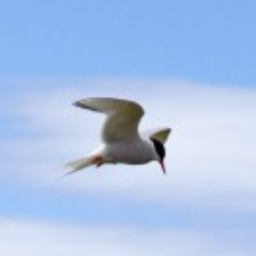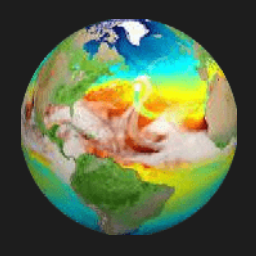publications
Presented in reverse chronological order.
2024
- Clouds and Seasonality on Terrestrial Planets with Varying Rotation RatesDaniel A. Williams, Xuan Ji, Paul Corlies, and 1 more authorThe Astrophysical Journal, Feb 2024
Using an idealized climate model incorporating seasonal forcing, we investigate the impact of rotation rate on the abundance of clouds on an Earth-like aquaplanet, and the resulting impacts upon albedo and seasonality. We show that the cloud distribution varies significantly with season, depending strongly on the rotation rate, and is well explained by the large-scale circulation and atmospheric state. Planetary albedo displays nonmonotonic behavior with rotation rate, peaking at around 1/2\textohmE. Clouds reduce the surface temperature and total precipitation relative to simulations without clouds at all rotation rates, and reduce the dependence of total precipitation on rotation rate, causing nonmonotonic behavior and a local maximum around 1/8\textohmE; these effects are related to the impacts of clouds on the net atmospheric and surface radiative energy budgets. Clouds also affect the seasonality. The influence of clouds on the extent of the winter Hadley cell and the intertropical convergence zone is relatively minor at slow rotation rates (<1/8\textohmE), but becomes more pronounced at intermediate rotation rates, where clouds decrease their maximum latitudes. The timing of seasonal transitions varies with rotation rate, and the addition of clouds reduces the seasonal phase lag.
@article{williams2024-Clouds, title = {Clouds and {{Seasonality}} on {{Terrestrial Planets}} with {{Varying Rotation Rates}}}, author = {Williams, Daniel A. and Ji, Xuan and Corlies, Paul and Lora, Juan M.}, year = {2024}, month = feb, journal = {The Astrophysical Journal}, volume = {963}, number = {1}, pages = {36}, publisher = {The American Astronomical Society}, issn = {0004-637X}, doi = {10.3847/1538-4357/ad192f}, urldate = {2024-02-27}, langid = {english}, keywords = {Isca}, file = {/home/daniel/Documents/exeter/zotero/Williams_et_al._2024-clouds_and_seasonality_on_terres.pdf}, }
2023
- Global warming and arctic terns: Estimating climate change impacts on the world’s longest migrationJoanne M. Morten, Pearse J. Buchanan, C. Egevang, and 11 more authorsGlobal Change Biology, Feb 2023
Abstract Climate change is one of the top three global threats to seabirds, particularly species that visit polar regions. Arctic terns migrate between both polar regions annually and rely on productive marine areas to forage, on sea ice for rest and foraging, and prevailing winds during flight. Here, we report 21st-century trends in environmental variables affecting arctic terns at key locations along their Atlantic/Indian Ocean migratory flyway during the non-breeding seasons, identified through tracking data. End-of-century climate change projections were derived from Earth System Models and multi-model means calculated in two Shared Socioeconomic Pathways: ‘middle-of-the-road’ and ‘fossil-fuelled development’ scenarios. Declines in North Atlantic primary production emerge as a major impact to arctic terns likely to affect their foraging during the 21st century under a ‘fossil-fuelled development’ scenario. Minimal changes are, however, projected at three other key regions visited by arctic terns (Benguela Upwelling, Subantarctic Indian Ocean and the Southern Ocean). Southern Ocean sea ice extent is likely to decline, but the magnitude of change and potential impacts on tern survival are uncertain. Small changes (<1 m s−1) in winds are projected in both scenarios, but with minimal likely impacts on migration routes and duration. However, Southern Ocean westerlies are likely to strengthen and contract closer to the continent, which may require arctic terns to shift routes or flight strategies. Overall, we find minor effects of climate change on the migration of arctic terns, with the exception of poorer foraging in the North Atlantic. However, given that arctic terns travel over huge spatial scales and live for decades, they integrate minor changes in conditions along their migration routes such that the sum effect may be greater than the parts. Meeting carbon emission targets is vital to slow these end-of-century climatic changes and minimise extinction risk for a suite of polar species.
@article{morten2023-Global, author = {Morten, Joanne M. and Buchanan, Pearse J. and Egevang, C. and Glissenaar, Isolde A. and Maxwell, Sara M. and Parr, Nicole and Screen, James A. and Vigfúsdóttir, Freydís and Vogt-Vincent, Noam S. and Williams, Daniel A. and Williams, Ned C. and Witt, Matthew J. and Hawkes, Lucy A. and Thurston, William}, title = {Global warming and arctic terns: Estimating climate change impacts on the world's longest migration}, journal = {Global Change Biology}, volume = {29}, number = {19}, pages = {5596-5614}, keywords = {arctic tern, climate change, CMIP6, migration, net primary productivity, sea ice, Sterna paradisaea, wind}, doi = {https://doi.org/10.1111/gcb.16891}, url = {https://onlinelibrary.wiley.com/doi/abs/10.1111/gcb.16891}, eprint = {https://onlinelibrary.wiley.com/doi/pdf/10.1111/gcb.16891}, year = {2023} }
2022
- The Bristol CMIP6 Data HackathonDann M. Mitchell, Emma J. Stone, Oliver D. Andrews, and 12 more authorsWeather, Feb 2022
The Bristol CMIP6 Data Hackathon formed part of the Met Office Climate Data Challenge Hackathon series during 2021, bringing together around 100 UK early career researchers from a wide range of environmental disciplines. The purpose was to interrogate the under-utilised but currently most advanced climate model inter-comparison project datasets to develop new research ideas, create new networks and outreach opportunities in the lead up to COP26. Experts in different science fields, supported by a core team of scientists and data specialists at Bristol, had the unique opportunity to explore together interdisciplinary environmental topics summarised in this article.
@article{mitchell2022-Bristol, author = {Mitchell, Dann M. and Stone, Emma J. and Andrews, Oliver D. and Bamber, Jonathan L. and Bingham, Rory J. and Browse, Jo and Henry, Matthew and MacLeod, David M. and Morten, Joanne M. and Sauter, Christoph A. and Smith, Christopher J. and Thomas, James and Thomson, Stephen I. and Wilson, Jamie D. and the Bristol CMIP6 Data Hackathon Participants}, title = {The Bristol CMIP6 Data Hackathon}, journal = {Weather}, volume = {77}, number = {6}, pages = {218-221}, doi = {https://doi.org/10.1002/wea.4161}, url = {https://rmets.onlinelibrary.wiley.com/doi/abs/10.1002/wea.4161}, eprint = {https://rmets.onlinelibrary.wiley.com/doi/pdf/10.1002/wea.4161}, year = {2022}, }

